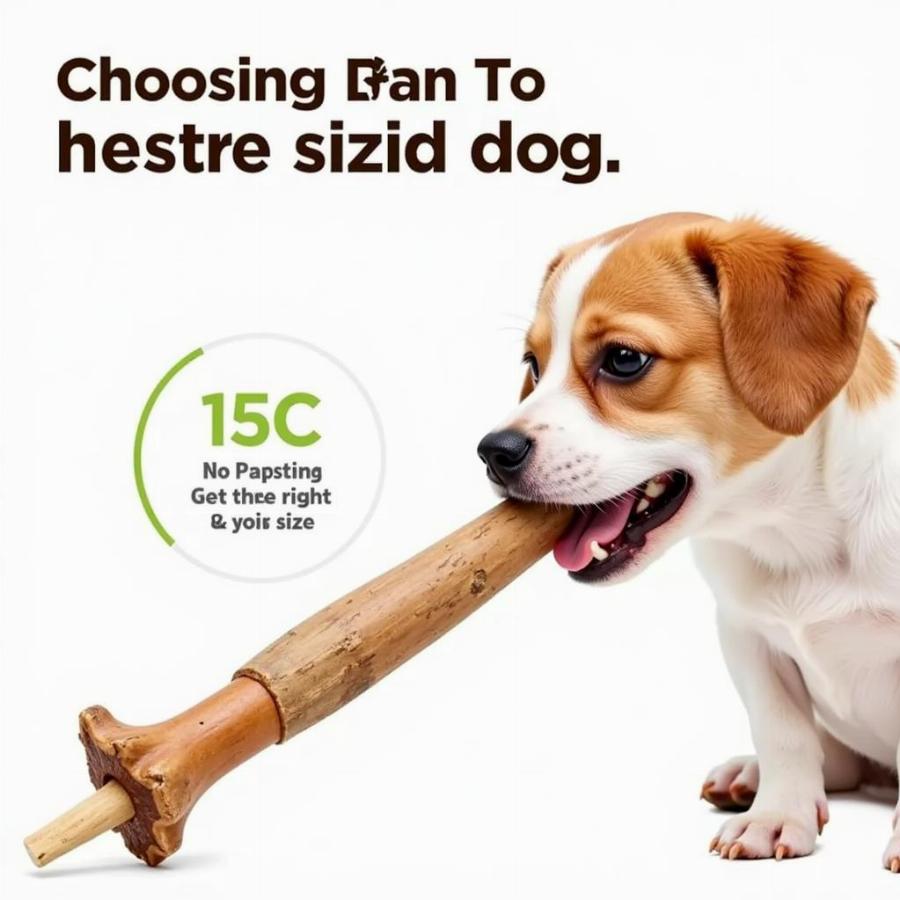Finding safe chew bones for dogs can feel like navigating a minefield. With so many options available, it’s crucial to understand which chews are safe and beneficial for your furry friend. This comprehensive guide will explore everything you need to know about selecting the perfect and safe chew bones for your dog, ensuring a happy and healthy chewing experience. From understanding the benefits of chewing to identifying potential hazards and exploring different types of safe chews, we’ll equip you with the knowledge to make informed decisions.
Why Do Dogs Love to Chew?
Chewing is a natural and instinctive behavior for dogs of all ages. For puppies, it helps relieve the discomfort of teething. For adult dogs, chewing provides mental stimulation, relieves anxiety, and helps maintain good dental hygiene. Choosing the right chew bone can satisfy this natural urge while also promoting their overall well-being.
The Dangers of Unsafe Chew Bones
Before diving into the world of safe chew bones, it’s important to understand why some chews can be hazardous. Cooked bones, especially poultry bones, are a definite no-no. They splinter easily, posing a serious risk of choking, internal punctures, and blockages. Similarly, bones that are too hard can cause fractured teeth. Knowing what to avoid is just as important as knowing what to choose. Can dogs have cooked ham bones? Absolutely not! Find out more about the risks in our dedicated article: can dogs have cooked ham bones.
What are Safe Chew Bones for Dogs?
So, what constitutes a safe chew bone? Ideally, a safe chew is durable enough to withstand vigorous chewing but not so hard that it risks damaging your dog’s teeth. It should also be digestible, minimizing the risk of blockages. Let’s explore some popular and safe options.
Bully Sticks
Bully sticks are a single-ingredient chew made from beef muscle. They are highly digestible, long-lasting, and a favorite among many dogs.
Natural Rubber Chew Toys
Natural rubber toys are a great alternative for dogs who are aggressive chewers. They are durable, non-toxic, and come in a variety of shapes and sizes. Some even have compartments for treats, adding an extra layer of engagement.
Nylon Chew Bones
Nylon bones are another durable option. Look for nylon bones that are specifically designed for aggressive chewers. Avoid those that are too hard, as they can potentially damage teeth.
How to Choose the Right Size Chew Bone
Choosing the appropriate size chew bone is crucial for your dog’s safety. A chew that’s too small can be a choking hazard, while a chew that’s too large can be difficult for your dog to manage. Always select a chew that’s appropriately sized for your dog’s breed and chewing habits. If your dog enjoys peanut butter, consider these delicious and entertaining dog bones with peanut butter.
 Safe Chew Bones for Small Dog Breeds
Safe Chew Bones for Small Dog Breeds
What if My Dog Eats Chicken Bones?
If your dog accidentally ingests cooked chicken bones, contact your veterinarian immediately. Chicken bones can splinter and cause serious internal injuries. Learn more about the potential dangers of chicken bones in our article: can chicken bones hurt dogs. Prevention is always the best course of action, so make sure to keep cooked chicken bones well out of your dog’s reach.
Supervising Chew Time
Even with the safest chew bones, supervision is key. Always monitor your dog while they’re chewing to prevent choking hazards and ensure they’re not ingesting large pieces of the chew.
Are Rawhide Chews Safe?
While rawhide chews are popular, they can pose some risks. Some dogs have difficulty digesting rawhide, which can lead to digestive upset or blockages. If you choose to give your dog rawhide, opt for high-quality rawhide and always supervise chew time.
Dental Chews for Healthy Teeth
Dental chews can help promote good oral hygiene by scraping away plaque and tartar buildup. Look for dental chews that are veterinarian-approved and designed to improve dental health. For larger breeds, check out our article on chew toys designed for their needs: dog chew toys for large dogs.
What Should I Do if My Dog Swallows a Chew Toy Piece?
If your dog swallows a piece of a chew toy, contact your veterinarian immediately. Depending on the size and material of the piece, it could cause a blockage.
Conclusion
Choosing safe chew bones for dogs is a vital part of responsible pet ownership. By understanding the potential risks and benefits of different chew types, and by following the guidelines outlined in this article, you can ensure your furry friend enjoys a happy, healthy, and safe chewing experience. Remember, providing your dog with appropriate chews is not just about satisfying their natural instincts; it’s about contributing to their overall well-being.
FAQ
- What are the best chew bones for puppies?
- Are antlers safe for dogs to chew on?
- How often should I replace my dog’s chew bones?
- Can I give my dog ice cubes to chew on?
- What are the signs of a blockage caused by a chew toy?
- Are there any chew toys that help with separation anxiety?
- How do I know if a chew bone is too hard for my dog?
Further Reading
For more information about dog health and safety, explore other articles on Beaut Dogs, such as “Dog Eats Chicken Bones.”
Beaut Dogs: Your Trusted Source for Canine Information
Beaut Dogs is your one-stop shop for everything related to dog care, offering expert advice and in-depth knowledge on various breeds, health, training, and nutrition. From understanding breed specifics to providing practical tips on grooming and exercise, we strive to empower dog owners with the information they need to provide the best possible care for their canine companions. When you need assistance, contact us at Email: [email protected] to receive detailed and accurate answers from Beaut Dogs.